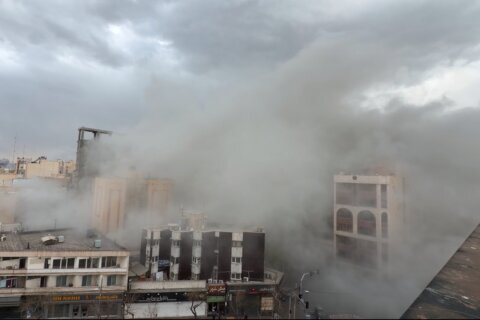WASHINGTON — The secretive and dangerous world of terrorism is again threatening the West, specifically the United States. In a recently released video by al Qaida in the Arabian Peninsula showing more than 100 fighters gathered in Yemen, some faces were purposely blurred. That has raised concern that those faces may be those of assets already dispatched to launch attacks.
AQAP’s acumen for planning and launching sophisticated attacks is driving the concern.
“There’s no doubt that AQAP is one of the most dangerous terrorist groups. This is a network that since 2009 repeatedly has tried to attack the United States with innovative tactics and ambitious plots,” a U.S. counter- terrorism official told WTOP.
“The rhetoric captured in the recent video indicates that striking America remains at the top of the group’s agenda,” the official said.
In addition to AQAP’s obsession with attacking the U.S., another group has gone to extreme lengths to protect its intent to attack American interests.
The Islamic State of Iraq and the Levant, or ISIL, a former al Qaida affiliate that was forced out of the al Qaida family for its brutal tactics and disobedience, is locked in a bitter feud with al Qaida leader Ayman Al-Zawahiri over its fixation on attacking the U.S.
ISIL, which is run by Abu Bakr Al-Baghdadi, was established in the early years of the Iraq War and pledged allegiance to al Qaida in 2004. Known then as “al-Qaida in Iraq,” the group, composed of and supported by a variety of insurgent groups, tried through brutal tactics to establish a caliphate in the Sunni majority populated regions of Iraq, and last year tried the same tactics in Syria.
The feud boiled over when Zawahiri ordered the ISIL to cease its operations in Syria. Shortly after, Zawahiri’s chief representative, Abu Khaled al-Suri, was targeted and killed in a suicide bombing in Aleppo, Syria, on Feb. 23.
“I look at it like the five crime families in New York. When they’re working together, they’re working together, and when they find some business difference, they’ll kill each other. And I think you’re seeing a little bit of that now,” said House Intelligence Committee Chairman Mike Rogers, R-Michigan.
According to Rogers, Al Baghdadi’s organization has gained strength over time and found operational space in Syria.
“The difference was, Al-Baghdadi wanted to focus on westerners and other things, and talked about talked about external operations in Europe and in the United States,” he said.
Al Qaida has five direct affiliates and 14 indirect affiliates. In part, by design, all of them have aspirations of attacking the west, namely the U.S. But al Qaida central has ordered the focus to remain on regional and local issues and officials in their areas.
“What this does is show you the sheer number of these affiliates popping up that have their own strength and their own ideas about carrying out activities. That’s why I argue there’s more of a threat stream from al Qaida today than we saw even before 9/11,” Rogers said.
The counter-terrorism official who spoke to WTOP pointed to AQAP as the tip of the spear.
“Within Yemen, AQAP’s ruthless campaign of coordinated assaults, bombings and assassinations has taken the lives of hundreds of innocent men, women and children. Its deadliest operations have targeted Yemeni military installations and other government sites.”
At the same time, the official said, “We remain concerned that the group is pursuing western, to include U.S., interests in Yemen. It was less than a year ago — in August 2013 — when we temporarily suspended operations at our embassy in Sana out of an abundance of caution in the face of a credible threat.”
Follow @WTOP on Twitter and WTOP on Facebook.







